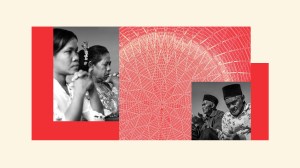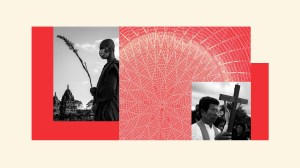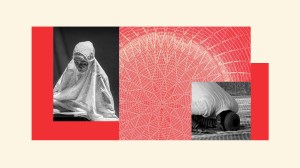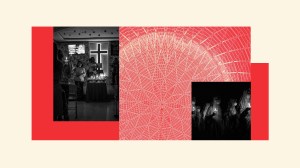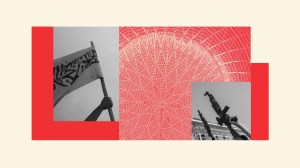In this series
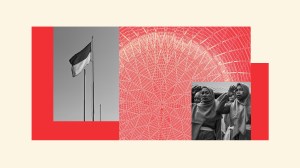
About 80 percent of Muslims believe that being Muslim is essential to being truly Indonesian, according to a special report by the Pew Research Center. We asked a panel of six Indonesian leaders—three Muslims and three Christians—their thoughts on how their religion plays into what it means to them to be Indonesian.
Muslim respondents:
Halim Mahfudz: From an Islamic perspective, your religion colors all your actions, including your behavior, ethics, and relationships with other human beings. So, religion and state are not separate. If governance is colored by religious values—not limited to Islam but the six recognized religions in Indonesia—there will be no conflict.
In Islam, there is no verse that compels others to worship in the same way Muslims do, and the Quran does not allow the government to impose Islamic values on all religions. The Quran says that Prophet Muhammad was sent to this earth for no other purpose than to be a mercy to all creatures and that we are to show compassion to all beings.
In the years leading up to his death, Muhammad sent his companions to migrate to Ethiopia, which was ruled by a Christian, King Najash. The king said that he would not hand over the Muslim migrants to the Quraysh Arabs, and then he passed away. Muhammad performed a funeral prayer (salat al-gha'ib) for the king. This demonstrates the respect of Muhammad to fellow humans, even though they were not Muslims.
Inayah Rohmaniyah: The strength of the tie between one’s Islamic identity and Indonesian identity does not imply that non-Muslims are not Indonesians.
What needs to be reinforced, especially among the younger generation, is the historical awareness of the relationship between the state and one’s religion to continue the spirit of the nation’s founders. But young people are losing this connection and nationalism is eroding. History is often considered unimportant, though it serves as a guiding light showing us the path forward.
Indonesia’s struggle for independence is not solely about majority and minority issues. It’s the result of the work and struggle of all citizens, a boundless struggle that is not limited by ethnicity, religion, or race. Once we have achieved independence, we have to protect our country. We must do so together by embracing all religions, races, and intergroup relations, just as we fought for independence together in the past. This way, the threat of division can be minimized.
Amin Abdullah: I distinguish between a nation-state and a religious state. In India, some Hindus claim that if you’re not Hindu, you’re not Indian (the Hindutva movement), even though India is a nation-state. In Indonesia, it’s not like that. There’s still a constitution that needs to be observed. A nation-state is based on its constitution, which involves a state apparatus and civil society with various components sharing responsibility and safeguarding the nation and the state.
That's why the historical milestones of the nation become essential. First, the Youth Pledge in 1928 promoted the idea of a united Indonesia, as it doesn’t mention religion, just one homeland, one language, and one nation. Second, in 1945, the constitution and Pancasila emerged, making it clear that we believe in God in a way that provides space for different religions. These are the values that need to be nurtured and propagated.
Thus, members of other religions can confidently say, “I am a Buddhist or Christian, and I am Indonesian.”
Christian respondents:
Tantono Subagyo: Being a Christian in Indonesia means being part of a community that believes in Jesus Christ as their Lord and Savior and strives to follow his teachings and example in everyday life. We are also asked to love and serve our fellow human beings, especially those different from us. We must respect and appreciate the religious, cultural, and ethnic diversity in Indonesia and contribute to building peace, justice, and progress together.
However, we must also remember that we are citizens of the kingdom of God who are temporarily residing in this world. We should not prioritize the interests of the nation over Christ. At the same time, we should not be involved in conflicts, violence, or discrimination contrary to the values of the gospel.
Ferry Mamahit: Many Christians in Indonesia, driven by a strong sense of nationalism, have sacrificed their lives for the cause of independence and democracy for Indonesia. This is not just a form of loyalty and dedication to the nation and state, but also to Christian values such as justice, truth, love, and peace.
Although the Bible does not explicitly use the term nationalism, principles such as protecting national sovereignty, the right to self-determination, and promoting the welfare of the nation align with biblical teachings (Rom. 13:1–7; Jer. 29:7). In practical terms, living according to the truth of the Bible makes a Christian a true “Indonesian Christian” (100 percent Indonesian, 100 percent Christian).
Farsijana Adeney Risakotta: When a Muslim considers that being a Muslim also means being truly an Indonesian, it implies an acceptance that their Islamic identity is shaped within the context of being Indonesian. Indonesia is not an Islamic state but a pious one where its citizens can coexist with people of various religions and backgrounds.
During Dutch colonialism, the Netherlands sent missionaries to open schools for the common people. The message of Christ’s liberation was a blessing to Indonesia.
Yet the independence of Indonesia was not a gift from Dutch Christians but the result of the sacrifice and struggle of Christians and people of various other religions in Indonesia. Therefore, Pancasila, as the foundation of the state, is the result of an agreement that involves Christians negotiating their citizenship rights—equal to those of Muslims.
Read our panelists’ bios in the series’ lead article, Parsing Pancasila: How Indonesia’s Muslims and Christians Seek Unity. (Other articles in this special series are listed to the right on desktop or below on mobile.)


